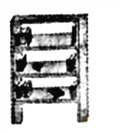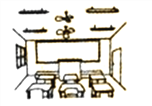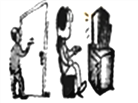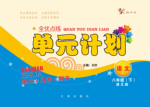
【题目】看图写话

【1】Be good at__________________________________

【2】bad _________________________________

【3】there be__________________________________

【4】keep, tidy__________________________________

【5】when, knock at __________________________________
【答案】
【1】Jane is good at swimming.
【2】It’s bad to read in the sun./Reading in the sun is bad for your eyes.
【3】There are some/ many books on the shelf/shelves.
【4】We should/had better keep our classroom tidy.
【5】She was watching TV when somebody/someone knocked at the door.
She is watching TV when somebody /someone knocks at the door.
【解析】
【1】根据be good at擅长,和图片,可知是Jane擅长游泳;故答案是:Jane is good at swimming.
【2】根据bad坏的,和图片,可知是在太阳下读书,对你的眼睛有害;故答案是: It’s bad to read in the sun./Reading in the sun is bad for your eyes.
【3】根据there be有,和图片,可知是在架子上有许多书或者有一些书,故答案是There are some/ many books on the shelf/shelves.
【4】根据keep保持, tidy整洁,和图片,可知是我们应该保持我们的教室整洁;故答案是 We should/had better keep our classroom tidy.
【5】根据 when当---时候; knock at 敲;和图片,可知是当有人敲门时,她在读书,可以是现在时态,也可以是过去时态,主句用进行时态;故答案是She was watching TV when somebody/someone knocked at the door.或She is watching TV when somebody /someone knocks at the door.


 全优点练单元计划系列答案
全优点练单元计划系列答案科目:初中英语 来源: 题型:
【题目】I am all tears, ____,I am listening to you with all attention.
A.in another words B.in the other words
C.with other words D.in other words
查看答案和解析>>
科目:初中英语 来源: 题型:
【题目】________ in 2014,I study English hard every day.
A.Go to England
B.To go to England
C.Going to England
D.Goes to England
查看答案和解析>>
科目:初中英语 来源: 题型:
【题目】善待他人是中华民族的传统美德。某英文网站正在开展以“团结友善”为 主题的征文活动。假如你是李华,请你用英文写一篇短文投稿,说说你对善待 他人的看法,你曾经友善待人的经历,以及你的感受。
提示词语:important, help, happy
提示问题:What do you think of being kind to others?
What did you do?
How do you feel

Being kind to others is a traditional virtue (美德) of Chinese people.
查看答案和解析>>
科目:初中英语 来源: 题型:
【题目】My uncle has two pet dogs.But________of them is friendly to me.
A.each
B.neither
C.either
D.both
查看答案和解析>>
科目:初中英语 来源: 题型:
【题目】C)根据短文内容,从下面方框中选择适当的单词或短语填空,使短文内容完整正确,并将答案填写在答题纸标号为71~75的相应位置上。
![]()
When doing his math homework, Lu Lifei, 14, from Jiangsu, came across a problem. He couldn’t 【1】. So he took out his cell phone, opened a special app and searched the problem. Answers soon appeared on the screen. “It’s convenient. You don’t have to 【2】 late to solve the problem or get a tutor on the spot,” Lu said. Nowadays, some students just copy the answers online without thinking carefully enough. They become 【3】. Knowing how to use the Internet is important. The key is that we must have good self-control. No matter how difficult the problem is, think about it independently (独立地) first. Be sure to understand the reasons behind the answers, or you won’t 【4】. If you’re not confident about your self-control, ask your parents for help. I think you will see 【5】 ahead of you.
查看答案和解析>>
科目:初中英语 来源: 题型:
【题目】阅读短文,根据短文内容回答问题。

We see them everywhere — on boxes of food, on packages and on CDs. They, of course, are bar codes. The invention of bar codes has changed the way we shop and how companies learn where their products are.
It was two university students from America, Bernard Silver and Norman Woodland, who first got theidea of bar codes. In 1948, they heard that the president of a food company was looking for a way to easily get information about what was being sold to customers. They tried to help by using a code system. They invented a large electronic reader to read the codes. However, computers couldn’t easily record the data that was read.
Then, in the 1960s, David Collins made important developments in bar codes. He developed a system for recognizing train carriages. In order to develop the recognition system for other kinds of businesses, Collins started his own company. In 1969, Collins’s company put a bar code reading system in a car factory, showing that bar codes could be useful.
Shortly after Collins started his company, an American electronic company called RCA also saw the potential (潜力) of bar codes to help businesses. RCA’s
system, which recorded how much of a product was sold, was not perfect. Since bar codes were not common, not all products had them and different companies used different codes. Then, Woodland helped develop the Universal Product Code (UPC), which gave every product a code that included information about the manufacturer and the kind of product being sold. This made bar codes much more practical.
In addition to shops, hospitals use bar codes to recognize patients by giving them cards with bar codes on them. Libraries use bar codes to record which books have been lent, and airports use them to find out where bags are going. Bar codes have made life much easier and simpler.
【1】What changed the way we shop?
【2】Who first got the idea of bar codes?
【3】Why did Collins start his own company?
【4】What do hospitals use bar codes to do?
【5】What is the passage mainly about?
查看答案和解析>>
科目:初中英语 来源: 题型:
【题目】(2013辽宁沈阳)—Could you tell me the way to the Science Museum,please?
—Yes,walk along the street.You’ll see it ________ your left.
A.on
B.in
C.for
D.over
查看答案和解析>>
湖北省互联网违法和不良信息举报平台 | 网上有害信息举报专区 | 电信诈骗举报专区 | 涉历史虚无主义有害信息举报专区 | 涉企侵权举报专区
违法和不良信息举报电话:027-86699610 举报邮箱:58377363@163.com